50 years on, the enduring lessons of JFK's presidency
November 20, 2013 -- Updated 1553 GMT (2353 HKT)
STORY HIGHLIGHTS
- Friday marks the 50th anniversary of the assassination of John F. Kennedy
- Presidency offers lessons on U.S. policy in Mideast and China - Andrew Hammond
- Hammond: JFK powerfully renewed U.S. global leadership, helping to thaw Cold War
- Objective appraisal of JFK's presidency must highlight lows and highs, he adds
Editor's note: Andrew
Hammond was formerly a special adviser in the government of former UK
Prime Minister Tony Blair, and also a geopolitical analyst at Oxford Analytica.
(CNN) -- This Friday marks the 50th anniversary of
the assassination of John F. Kennedy, one of history's most notable
figures. Despite holding office for less than a full term, he has long
been perceived by the U.S. public as one of the best occupants of the
White House.
Yet JFK's presidency is
inspiring not just to Americans, but also to many others around the
world too. And it offers key lessons for today, ranging from U.S. policy
in the Middle East post-9/11, to how to best engage a "rising" China.

Andrew Hammond
At a time when
U.S.-Soviet rivalry was becoming heavily militarized, JFK's political
genius was to appreciate that the superpower contest was as much a
battle for ideas as strength of force. Through his skilful rebalancing
of hard and soft power, he powerfully renewed U.S. global leadership,
helping to thaw the Cold War.
Here his projection of
hope and optimism, and stirring rhetoric appealed to U.S. and
international audiences alike, including those behind the Iron Curtain.
Landmark speeches included the one he made in Berlin in 1963 when he
offered U.S. solidarity with West Germany.
And his desire to re-set U.S.-Soviet relations was expressed eloquently too, including a compelling speech at the American University
after the Cuban missile crisis. This was described even by Soviet
Premier Nikita Khrushchev as the "the greatest speech by any U.S.
president since [Franklin] Roosevelt."
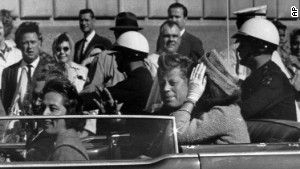 New photos of JFK's final minutes
New photos of JFK's final minutes
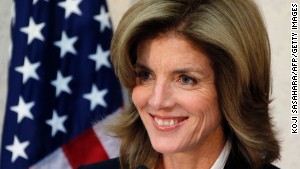 Kennedy in Japan
Kennedy in Japan
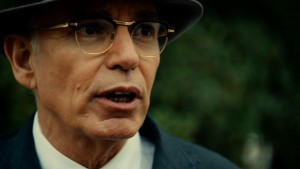 Film shows JFK's death from unseen angles
Film shows JFK's death from unseen angles
Renewal of U.S.
international policy was not just rhetorical, as initiatives like the
Peace Corps and the South America-focused Alliance for Progress
underline. And, through landmark achievements such as the International
Nuclear Test Ban Treaty, JFK gave substance to his ambition of moving
toward international peace.
To be sure, an objective
appraisal of JFK's period in the White House must highlight lows as well
as the highs. In addition to successes such as his management of the
Cuban missile crisis, there was also the Bay of Pigs invasion debacle.
And JFK had a much more
limited record of legislative success than his successor Lyndon Johnson.
Professional historians therefore tend to rate JFK's presidency as
"good," rather than "great," with reason.
Of course, the
circumstances of today are transformed from those of the early 1960s. As
well as the end of the Cold War, the United States has experienced
relative decline: for instance, its economy now accounts for less than a
quarter of global GDP compared to around a third then.
Yet, the relevance of
JFK's insights about international cooperation and peace endure. As does
the wisdom of much of the way in which he harnessed U.S. leadership and
power to try to achieve these ends.
Indeed, at a time of
U.S. military cutbacks, and given the ongoing information revolution,
the importance of achieving better balance between -- often expensive --
hard power assets and soft power resources is perhaps even more
important today for Washington. And this is true right across the world
from Asia-Pacific through the Middle East and South America.
On China policy, for
instance, some U.S. hawks advocate a much tougher stance toward Beijing.
However, as JFK would have recognized, Washington has much to gain from
cooperation with Beijing too, and it would be a mistake to view the
relationship solely through a lens of threat and suspicion.
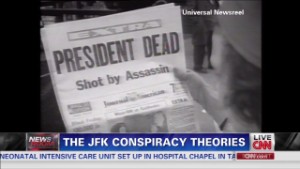 JFK conspiracy theories
JFK conspiracy theories
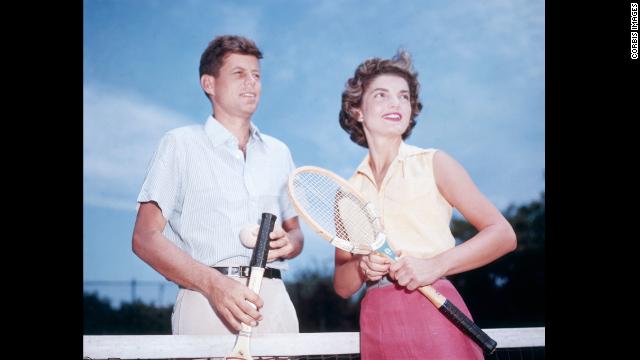 John and Jackie: A love story
John and Jackie: A love story
To be sure, there
remains a legitimate remaining need for maintaining significant U.S.
military power in Asia, not least to re-assure key allies. However, on
issues ranging from North Korea, terrorism, through to the future
stability of the global economy, China has a potentially key role to
play in concert with the United States.
Here the role of soft
power is key as Washington seeks to better integrate Beijing into a
network of regional and global institutions and alliances. In so doing,
this will help incentivize China even more strongly toward a path of
constructive partnership.
In the Middle East
meanwhile, U.S. standing in numerous countries has unfortunately been at
a low ebb now for at least a decade. Only 11% of the population in
Pakistan, 14% in Jordan, 16% in Egypt and the Palestinian territories,
and 21% in Turkey, currently have favourable views toward the United
States, according to Pew Global.
Despite some U.S.
overtures, the challenge remains monumental. This is such a critical
issue given the wide-range of U.S. priorities in Middle Eastern and
other Muslim-majority countries, including the "campaign against
terrorism."
As JFK would surely have
appreciated, there is a compelling need for redoubling efforts to win
the battle for moderate "hearts and minds." This can be best achieved
through a vigorous re-assertion of U.S. soft power, combined with
prudent use of hard power.
Such an agenda would
require much greater resourcing for activities such as public diplomacy,
broadcasting, development assistance and exchange programs. U.S. public
diplomacy is in particularly strong need of revitalization, with a
clearer long-term strategy essential.
Taken overall, it is
clear that JFK's key insights about international relations retain much
relevance and appeal. And for this reason alone, his presidency will
continue to hold not just enduring value, but also inspiration, right
across the world for many years to come.
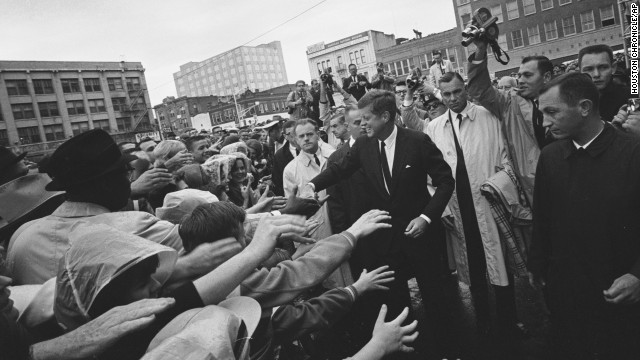
Nenhum comentário:
Postar um comentário